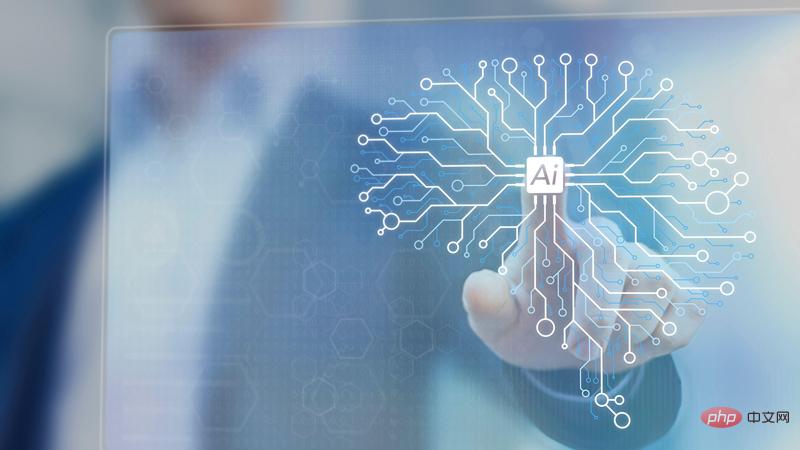Home >Technology peripherals >AI >Experts Talk丨Artificial Intelligence Technology Helps Research and Development of COVID-19 Vaccine
Experts Talk丨Artificial Intelligence Technology Helps Research and Development of COVID-19 Vaccine
- WBOYWBOYWBOYWBOYWBOYWBOYWBOYWBOYWBOYWBOYWBOYWBOYWBforward
- 2023-04-12 20:01:111289browse
In the early 1990s, Mr. Zhou Haizhong, an internationally renowned scholar, once predicted: "Artificial intelligence technology will be widely used in various disciplines and will produce unexpected effects." Today, more and more facts have proven his this prophecy. In the medical field, artificial intelligence technology plays an indispensable role in epidemics. At present, the new coronavirus pneumonia (COVID-19) and its mutation Omicron are still spreading around the world; in order to build an immune barrier, on the one hand, COVID-19 vaccination or oral COVID-19 medicines are used, and on the other hand, effective measures are implemented Precaution.

Whether it is genetic sequencing of the new coronavirus, finding the source of the virus and its transmission host, or developing a virus vaccine or special medicine, artificial intelligence technology is of great use in the fight against the new coronavirus. land. Recently, the World Health Organization (WHO) made a preliminary assessment of the existing vaccines against the new coronavirus and its mutations; they said that developing a universal vaccine for the new coronavirus is an option worth looking forward to, but it is difficult to decide how long it will take. Conclusion. Many research institutions are using artificial intelligence technology to develop COVID-19 vaccines and have initially achieved remarkable results.
For example, Nippon Electric Co., Ltd. (NEC) recently used artificial intelligence technology to develop the next generation of COVID-19 vaccines. The messenger ribonucleic acid (mRNA) vaccine currently used against the new coronavirus introduces the mRNA containing the encoding antigen protein into the human body to form the corresponding antigen protein, thereby inducing the body to produce a specific immune response and achieving the effect of preventive immunity. However, a large number of mutations have recently appeared in the spike protein of the new coronavirus, resulting in a decrease in the protective effect of the vaccine. Therefore, the company’s strategy is to use all viral proteins other than the spike protein as candidate antigens, excluding those parts that are prone to mutation; to this end, researchers use artificial intelligence technology to learn experimental data of immune responses to identify candidate antigens.
For another example, the working principle of the new coronavirus vaccine developed by Imperial College London is to use artificial intelligence technology to train the immune system to recognize and respond to infections by specific pathogens (such as viruses, parasites, or bacteria). At the heart of every vaccine is an antigen (a small, safe molecule based on part of the pathogen) that triggers a protective immune response. Most vaccine antigens are based on a single pathogen component, such as the spike protein of the coronavirus, or the coat protein of the malaria parasite, which limits the effectiveness and ability of vaccines to respond to new variants. To solve this problem, researchers integrated genomics, epidemiology, immunology, etc. to create new synthetic antigens.
Another example is that Northwestern University in the United States is using artificial intelligence technology to speed up research on a COVID-19 vaccine. Researchers at the school have developed a new algorithm that can predict which vaccine research results are most likely to be replicated; replicability means that the research results can be obtained again, which is a key signal that the research conclusions are valid. This model takes into account more factors than review experts, so the accuracy and effectiveness of the vaccine will be higher. They believe that when used alone, the model's accuracy is comparable to public research and evidence-based systematic confidence systems, and when used in conjunction with humans and machines, the accuracy will be even higher.
For another example, a research team at the Swiss Federal Institute of Technology in Zurich recently developed a new method of using artificial intelligence technology to predict future variants of coronaviruses, including the new coronavirus; it is expected to promote the development of next-generation antibody therapies and vaccines. Research and development provide important reference for formulating public health policies. The researchers said that this new method can help develop the next generation of antibody therapies. They have already developed some antibodies. The method can determine which antibodies have the broadest activity and is also expected to promote the development of the next generation of new crown vaccines.
In fact, China’s Baidu Company has already contributed a helping hand in solving the problem of the new crown vaccine. The company launched the world's first mRNA vaccine gene sequence design algorithm, LinearDesign, in 2020. This is an efficient algorithm specially used to optimize mRNA sequence design. For the COVID-19 mRNA vaccine sequence, LinearDesign can complete the sequence design within ten minutes, greatly improving the stability of vaccine design and protein expression level, and effectively solving the most important stability issue in the development of mRNA vaccines.
It can be seen that the in-depth combination of artificial intelligence technology and biopharmaceutical technology has turned the "needle in the haystack" of new crown vaccine development into "finding the picture." It is absolutely believed that with the efforts of scientific and technological personnel and the help of artificial intelligence technology, the research and development of the new coronavirus vaccine will soon achieve a major breakthrough in key core technologies, which will protect the life and health of all mankind.
The above is the detailed content of Experts Talk丨Artificial Intelligence Technology Helps Research and Development of COVID-19 Vaccine. For more information, please follow other related articles on the PHP Chinese website!
Related articles
See more- Technology trends to watch in 2023
- How Artificial Intelligence is Bringing New Everyday Work to Data Center Teams
- Can artificial intelligence or automation solve the problem of low energy efficiency in buildings?
- OpenAI co-founder interviewed by Huang Renxun: GPT-4's reasoning capabilities have not yet reached expectations
- Microsoft's Bing surpasses Google in search traffic thanks to OpenAI technology

